
The lele cart is a Mongolian-style ox cart also known as "jigger cart", "lolo cart" and "ox wagon". The term "lele" used to be herdsmen's cry when urging a domestic animal on. The lele cart is a vehicle especially designed for the natural conditions of the grassland in the north and ideal for Mongolian lifestyles. The cart is still very much in use in and around East Wuzhumuqin Banner.
The origin of the lele cart can be traced to the cart known as "thills and spokes" recorded in the History of the Western Han Dynasty. During the 2,000 odd years from the Qin and Han Dynasties to the 1970s and 1980s, the lele cart, nicknamed "the boat on the grassland", had been the most important means of transportation for herdsmen, playing a vital role in the life and work of the Mongolian ethnic people.
The lele cart is a mobile home for herdsmen, being the cart while traveling and a yurt when settled down. The small cart with two big wheels is completely made of wood, such as birch, pine, willow and elm, with no iron components. The cart is easy to make and repair. What's more, it is perfect for traveling on grasslands. So, the cart is called "a flyer on the grass" by local people. Apart from being used for moving yurts, materials and domestic water, the cart can also be used as a chariot carrying military supplies in war time.
Along with the burgeoning economic development, the lele cart has been gradually replaced by motor vehicles. Apart form a few remote areas where it's still used by herdsmen, the cart can hardly be found on the grassland.
